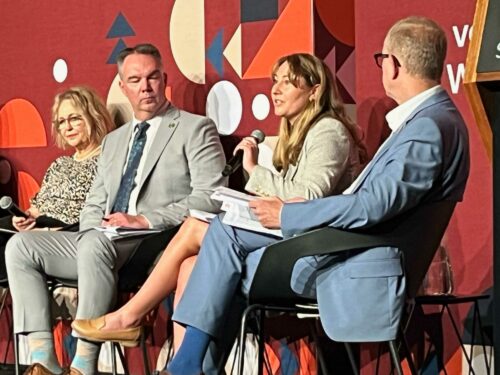
Five members of the ISCRR team recently presented ISCRR’s research at the 23rd World Congress on Safety and Health at Work in Sydney; two speakers and four digital posters.
ISCRR’s Senior Researcher and expert in evaluations, Dr Sarah Oxford, presented on the panel “Safer Work by Design: Innovations in OSH for High-Risk Work” alongside Jen Grigg, Thomas Kramer, Rory O’Neill, Dr Klaus Schäfer, moderated by Prof. Helen Lingard.

Dr Sarah Oxford speaking at the 23rd World Congress on Health and Safety at Work.
The panel discussed:
As the researcher voice on the panel, Sarah spoke about the factors associated with work-related violence and the benefits of adopting a systems-thinking approach to prevent it. Her talk was accompanied by a provocative video including quotes from those with lived experience of workplace violence.
ISCRR’s Research Officer and expert in vicarious trauma, Carmen Schroder, presented on the panel “Caring for Our People: Preventing Mental Health Harms” alongside Aimee Gayed, Brent Sutton, Elisa Ansoleaga, Ro-Ting Lin, Tom Oxley, moderated by Steven Worrall.
Carmen Schroder (far right) speaking at the 23rd World Congress on Health and Safety at Work.
The panel discussed:
Stronger manager support to lower psychological stress was a key feature of the discussion, with evidence drawn from The Black Dog Institute. Managers should not be expected to take on the role of a psychotherapist and managerial training should include programs that go beyond psychoeducation.
“You need more from your leader than wellbeing washing” – Tom Oxley, Workplace Director, Bamboo Mental Health
Carmen spoke about the evidence regarding the prevention of vicarious trauma and echoed other panellists on the importance of speaking with workers to plan for trauma, create job control and tailor ways to minimise or remove traumatic content.
ISCRR’s digital poster presentations included:
ISCRR found the conference a valuable experience for provoking thoughts on future research opportunities and networking with our colleagues and partners.
Photo at the top (from left to right): Dr Janine McMillan, Olivia Crivari, Dr Sarah Oxford, Carmen Schroder and Dr Jimmy Twin.